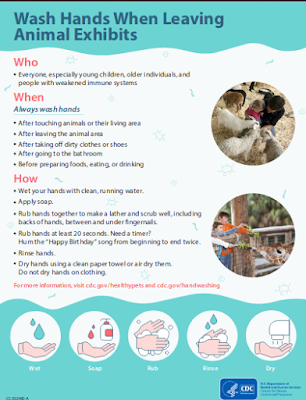#14,168
Just over a week ago, the San Diego County government released a statement on 4 pediatric E. Coli STEC infections linked to a petting zoo at the San Diego County Fair held in June (see San Diego County Fair: Cluster Of 4 Pediatric E. coli STEC cases (1 Fatal)).
Tragically, one child has died, and the number of confirmed and probable infections has continued to rise.
Four Cases of E. coli Bacteria Linked to San Diego County Fair
By County News Center, County of San Diego Communications Office
Jun. 29, 2019 | 2:40 PM
(Excerpt)
The source of the E. Coli bacteria is under investigation, but all children had a report of visiting the animal areas or the petting zoo, or had other animal contact at the San Diego Fair. As a result, San Diego County Fair officials have closed public access to all animal areas, including the petting zoo.
(Continue . . . )
On Wednesday of this week we saw an update (see San Diego: New Pediatric E. coli Case Possibly Linked To County Fair), and again on Friday afternoon the San Diego Health Department announced two more probable cases.
Two New Probable Cases of E. coli Bacteria Linked to Fair Reported
By Tom Christensen, County of San Diego Communications Office
Jul. 5, 2019 | 12:55 PM
Two new probable cases of Shiga toxin-producing E. coli (STEC) that may be related to animals at the San Diego County Fair have been reported, the County of San Diego Health and Human Services Agency announced today.
That brings the total to four confirmed and three probable cases.
The two new probable cases are:
“The investigation is ongoing, and even though the fair is over, there are likely more cases that will be reported,” said Dean Sidelinger, M.D., MSEd, interim deputy County public health officer. “This isn’t unusual for a public health investigation. We have asked local doctors to be on the lookout for symptoms of STEC.”
- A 2-year-old who visited the fair and reported contact with animals on June 22, became ill on June 26 and was not hospitalized.
- A 4-year-old who visited the fair and reported contact with animals on June 21, became ill on June 29 and is currently hospitalized.
The first four cases—including the death of a 2-year-old boy—were reported by the Health and Human Services Agency last Friday, and County health officials recommended that the San Diego County Fair close all animal exhibits to the public at that time.
Most people recover from STEC without major complications; however, 5 to 10 percent of people diagnosed with the bacteria develop a life-threatening kidney infection.
Most people with a STEC infection start feeling sick three to four days after eating or drinking something that contains the bacteria. Symptoms vary from person to person and often include:
Symptoms may occur with or without a fever. When present, the fever usually is not very high (less than 101˚F/38.5˚C). Most people get better within five to seven days. Some infections are very mild, but others are severe or even life-threatening.
- Severe abdominal cramps
- Watery or bloody diarrhea (3 or more loose stools in a 24-hour period)
- Vomiting
The best way to prevent an STEC infection is to practice good handwashing hygiene. Always wash your hands thoroughly after contact with animals or their environments (at farms, petting zoos, fairs, even your own backyard). Everyone, especially young children, older individuals, and people with weakened immune systems, should wash their hands before eating or drinking.
According to the CDC, animals most likely to carry E. coli O157 include:
And those must vulnerable to infection include:
- cows, especially calves
- goats
- sheep
- deer.
- Children younger than 5 years of age
- Adults aged 65 and older
- People with weakened immune systems, including pregnant women
- People who travel to certain countries
While we are normally on watch each summer for swine-origin flu cases linked to county fairs (see CDC FluView Week 21: 1 Novel (H1N1v) Flu Infection - Michigan), influenza isn't the only zoonotic disease that can arise at county and state fairs.
Which is why the CDC reminds everyone:

